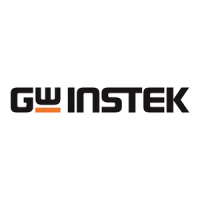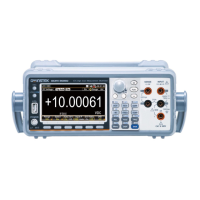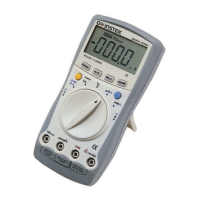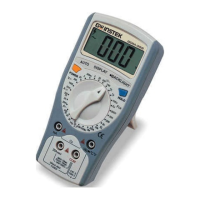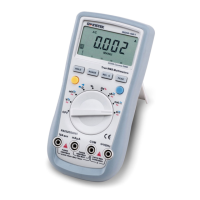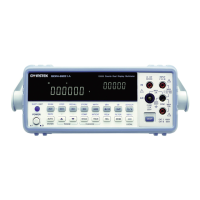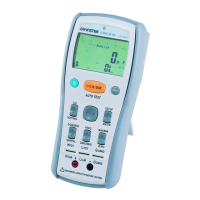Do you have a question about the GW Instek GDM-9060 and is the answer not in the manual?
Explains symbols used for safety warnings and cautions.
Provides essential rules and precautions for safe operation and handling of the instrument.
Outlines the key performance features and capabilities of the multimeter.
Describes the layout and functions of the instrument's front panel controls and display.
Details the connectors and ports located on the rear panel of the instrument.
Explains the icons and indicators displayed in the status bar of the instrument's screen.
Explains how to perform AC and DC voltage measurements using the instrument.
Details the procedure for measuring AC and DC current with the instrument.
Describes how to perform resistance measurements using both 2-wire and 4-wire methods.
Explains how to measure temperature using compatible probes and sensors with the instrument.
Introduces the dual measurement mode, allowing simultaneous viewing of two different measurement results.
Explains how to use the relative measurement function to store and subtract a reference value.
Details how to retain current measurement data and update only when exceeding a set threshold.
Covers the configuration of trigger conditions for initiating measurements.
Explains how to use digital filters to reduce noise and improve measurement accuracy.
Describes various mathematical operations like dBm, dB, Compare, MX+B, 1/X, and Percent.
Introduces the capabilities and functions of the digital I/O port for remote control and output signals.
Explains how the Digital I/O port outputs pass/fail results based on compare function limits.
Describes the mode for IO expansion by converting serial data into parallel data.
Details how to use the digital I/O pin for manual triggering of the instrument.
Guides on how to view instrument information like vendor, model, serial number, and firmware versions.
Explains the procedure for updating the instrument's firmware using a USB drive.
Covers settings related to system parameters like beep sound, key sound, date, and time synchronization.
Explains how to change passwords and enable/disable LAN password protection.
Explains how to adjust display settings including brightness, auto-off, and color themes for different displays.
Covers enabling or disabling time info or user-defined text on the 1st display when MathDisp is off.
Explains how to configure and perform screenshot capturing using USB flash drives.
Details the procedure for saving measurement data logs to a USB flash drive.
Describes how to define the maximum digit numbers displayed for each measurement.
Details how to shift to the Bar Meter display for viewing measurement values.
Explains how to shift to the Trend Chart display for viewing measurement data over time.
Describes how to shift to the Histogram display for visualizing measurement data distribution.
Covers the setup and configuration of various communication interfaces like RS232, USB, and GPIB.
Explains how to configure the USB interface, including protocol settings and connection.
Details the configuration parameters for the RS232 interface, such as baud rate and flow control.
Guides on activating and connecting the instrument via the Ethernet port for LAN control.
Explains the structure and rules for using SCPI commands for remote control.
Provides instructions on how to safely replace fuses in the instrument.
Details the procedure for replacing the internal battery, requiring qualified personnel.
Lists the default settings for various measurement and system parameters.
Presents detailed technical specifications for the instrument's performance and characteristics.
States the product's compliance with relevant technical regulations and standards.
| Temperature Range | -200 °C to 1372 °C |
|---|---|
| Weight | 2.5 kg |
| Measurement Types | DC Voltage, AC Voltage, DC Current, AC Current, Resistance, Frequency, Temperature, Capacitance |
| DC Voltage Range | 100mV to 1000V |
| AC Voltage Range | 100mV to 750V |
| DC Current Range | 100µA to 10A |
| AC Current Range | 100µA to 10A |
| Frequency Range | 10Hz to 1MHz |
| Resolution | 6 1/2 Digits |
| Interface | USB, RS-232 |
| Power Supply | AC 100 V ~ 240 V, 50 Hz ~ 60 Hz |
